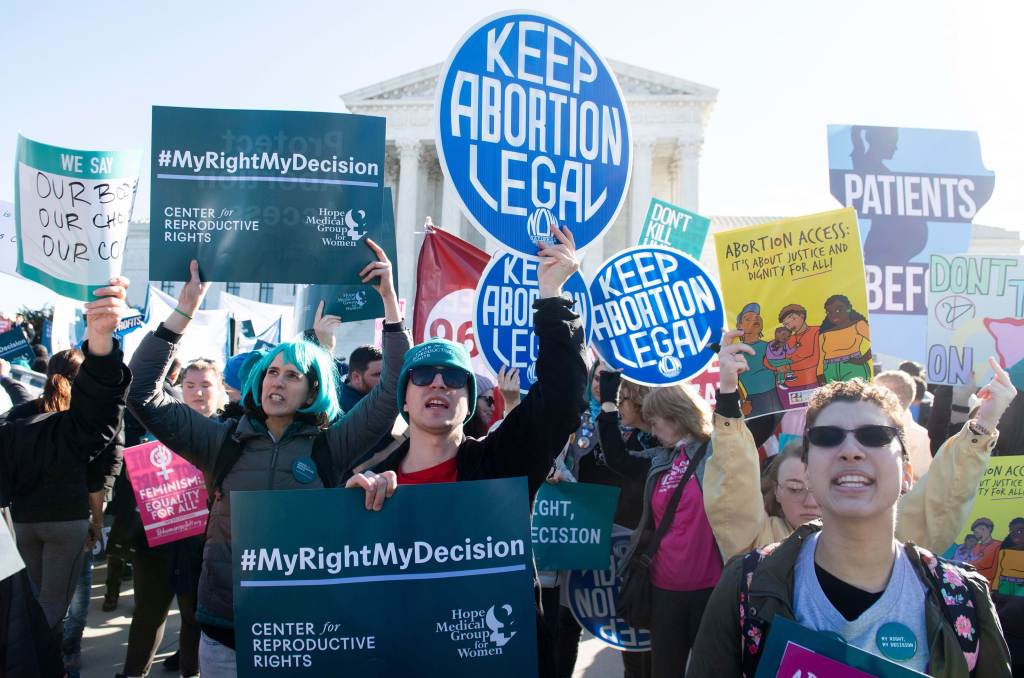
The staff at Shreveport’s Hope Clinic, one of Louisiana’s three remaining abortion providers, have been run ragged. In the last few months, the clinic was part of four simultaneous lawsuits at the state and federal level, including June Medical Services v. Russo, a pivotal case being decided by the Supreme Court this week. As COVID-19 spread across the United States, anti-abortion politicians in Louisiana began publicly suggesting that abortion was not an essential health service and threatening to shut down care. As neighboring Texas temporarily shut down access, Hope was inundated with panicked calls from out of state, begging for appointments.
To comply with social distancing precautions, the clinic had already limited its daily number of patients and curtailed its normal practices like offering patients tea and cookies and ensuring a patient’s support system was on hand after procedures. At one point, the clinic was forced to schedule patients a month out for first visits—in a state that already mandates a 24-hour waiting period and a ban on abortions after 20 weeks.
Abortions are already inherently stressful times for patients, but amid the pandemic, they’ve become a nightmare: an elaborate obstacle course as numerous states used the excuse of COVID-19 to close clinics.
“People had an appointment at one clinic and would go for their counseling appointment, then the clinics in the state would get shut down,” said Jennifer Dalven, director of the Reproductive Freedom Project at the American Civil Liberties Union, a Ford grantee. “They would go to another state, and they’d be past the gestational limit, or, because they had to see the same doctor for their initial counseling appointment, they couldn’t get an appointment.” One woman Dalven spoke to traveled to three different states to find a clinic that could provide her an abortion. “It’s like nothing I’ve ever seen.”
In April, when Louisiana Attorney General Jeff Landry formed a task force to enforce the suspension of “elective, non-emergency medical procedures,” Hope Clinic was targeted for warrantless raids by Landry’s staff, who demanded to review their safety protocols, equipment, and medical records of patients who’d received abortions since the pandemic began.
The Center for Reproductive Rights (CRR), a global reproductive rights legal advocacy group funded by Ford, along with Lift Louisiana, a grassroots group also supported by Ford, immediately sued the state to block its attempt to use public health directives to close abortion clinics, reaching an agreement that allowed the clinics to continue operating. In the end, 10 states—including six surrounding Louisiana—made similar attempts to restrict abortion access during the pandemic, prompting CRR, ACLU and their coalition partners to successfully challenge district courts to block bans in eight of the 10 states.
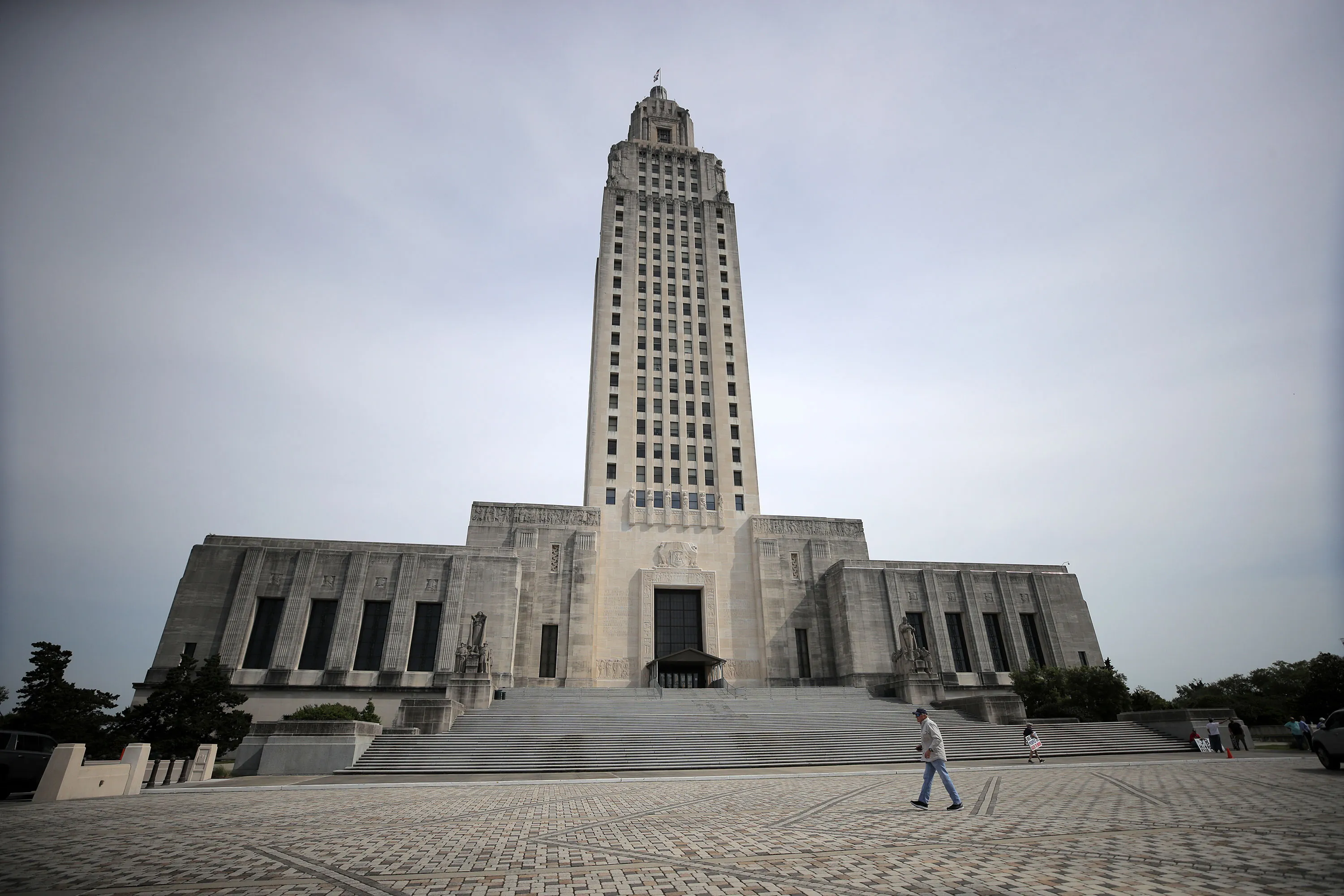
By June, as states began reopening, the team at Hope Clinic found themselves playing catch-up with women they couldn’t see earlier because they were flooded with requests from out-of-state patients. The wear on the staff was visible.
“I can always tell when they’re thinking about what’s going to happen next,” said Kathaleen Pittman, the clinic’s longtime administrator. “They’ll be going about their business and, all of a sudden, I see a very pensive expression cross their faces. And I know exactly what’s on their minds: ‘Are we going to be able to do this next week?’”
Some of the issues facing Hope Clinic have been building for years. Others were cast into sharp relief by the pandemic. Taken together, the state’s current situation paints a frightening preview of what a world without meaningful abortion access looks like—and indicates just how high the stakes are for June Medical Services v. Russo.
Ground Zero in America’s fight over abortion
“Louisiana has been one of the ground-zero areas of reproductive oppression since Roe v. Wade was decided,” said Steffani Bangel, executive director of the Louisiana Coalition for Reproductive Freedom, a Ford grantee. The state has more anti-abortion laws than any other in the country, and anti-abortion groups consistently vote it “the most pro-life state in America.”
That’s made Louisiana an important testing ground for new anti-abortion legislation, such as model laws drafted by “bill mills” like the American Legislative Exchange Council or Americans United for Life. Beyond the state’s 24-hour waiting period—which forces patients to make two separate appointments before their procedures—and 20-week ban, there are also laws mandating parental consent for minors, restricting medication abortions to abortion clinics only, and forbidding any insurance plan offered on the Louisiana health exchange from covering abortion costs.
Additionally, in 2015, the state more than tripled its licensing regulations for Louisiana abortion clinics, said Ellie Schilling, the co-founder of Lift Louisiana. The regulations function like classic “TRAP laws”—the “targeted restrictions on abortion providers” that have proliferated around the country over the last decade and hold providers to standards that aren’t applied to any other medical office—and which have a documented pattern of leading to clinic closures. “It just increases the administrative burden of operating a clinic, and therefore also the cost in terms of staffing, resources and the strain on what are small medical offices.”
Accessibility Statement
- All videos produced by the Ford Foundation since 2020 include captions and downloadable transcripts. For videos where visuals require additional understanding, we offer audio-described versions.
- We are continuing to make videos produced prior to 2020 accessible.
- Videos from third-party sources (those not produced by the Ford Foundation) may not have captions, accessible transcripts, or audio descriptions.
- To improve accessibility beyond our site, we’ve created a free video accessibility WordPress plug-in.
“There are all these layers upon layers of restrictions, the goal and purpose of which is to make it harder to get a license, harder to provide the services, harder and more humiliating for patients to seek these services,” said Lourdes Rivera, CRR’s Senior Vice President for US Programs. “We’ve been suing the state of Louisiana for more than 20 years because every legislative session they come up with something new to burden abortion access and which falls hardest on people with the fewest resources.”
These restrictions have led to some of the highest costs for abortion access in the nation. And, since there is no access in 92 percent of the state’s parishes, Bangel said, “It’s easier to drive across state borders than to try to access an abortion in Louisiana.” With procedures starting at $400, and many Louisianans forced to drive four to five hours to reach a clinic—which can entail a hotel stay or two trips because of the mandated waiting period, plus time off from work and child care—the costs quickly become prohibitive.
That means the burden of abortion restrictions fall disproportionately on poor women and women of color, especially in a poor state with a $7.25 minimum wage and the second-highest maternal mortality rate in the nation. “If you’re forcing black women to give birth without consent, you’re also asking them to stare down maternal mortality, since we’re three to four times more likely to die in childbirth,” said Lakeesha Harris, Director of Reproductive Health and Justice at the Louisiana nonprofit Women With A Vision (WWAV). “What we’re facing is not just whether women will have access to abortion services, but embedding them deeper in poverty, in racism, in being the most marginalized and least-served in our state.”
Due to the effect of the combined laws and regulations, Louisiana has gone from having 11 abortion clinics to three since 2001: Hope Clinic in Shreveport, and two other facilities in Baton Rouge and New Orleans. Whether those clinics remain open rests with the Supreme Court.
A Dangerous TRAP
In 2014, Louisiana passed Act 620, also known as the “Unsafe Abortion Protection Act,” a classic TRAP law that requires abortion providers to obtain admitting privileges at a hospital located within 30 miles of their clinic. Anti-abortion advocates claim it is a necessary means of ensuring that providers are properly credentialed so women received sound medical care.
In reality, there is no such need. Doctors are already credentialed and regulated in multiple ways—through their medical licenses, malpractice insurance standards, and the myriad institutions that oversee the medical field—and abortion is one of the safest medical procedures in the US. “There is no reason to have this extra layer for abortion providers,” said Rivera. “Providers hardly ever admit people to the hospital because of the safety of the procedure.” In 20 years, Hope Clinic has only transferred four patients to the hospital for emergency services.
Ironically, that rarity is one reason that abortion providers find it hard to obtain admitting privileges, since many hospitals require doctors to prove they’ll admit a certain number of patients each year—something most providers will never be able to do. Hospitals may also deny applications because they are religious institutions or teaching facilities that require staff to have academic credentials. In some states, hospitals have refused to even consider admitting privileges applications from abortion providers.
“It’s one of those things that sounds reasonable on its face but, when you look at the facts, there’s no reason for it,” said Rivera. “It provides no purpose except to weed out abortion providers from being able to provide services in the state.”
Louisiana’s Act 620 was modeled on—and is nearly identical to—a law passed in Texas in 2013 that also imposed admitting privilege requirements on abortion providers and led to the closure of nearly half the state’s clinics, declining from 41 to 22 over three years. (This March, Vox noted that both Louisiana’s and Texas’s laws closely resemble a model bill drafted by Americans United for Life.) When CRR first challenged Act 620 in 2014, the US District Court for the Middle District of Louisiana granted them a preliminary injunction to block the law, but it was appealed by the Fifth Circuit Court, leaving only one clinic open in the state—Hope Clinic—and only one doctor to provide abortions to the 10,000 people in Louisiana who have the procedure each year.
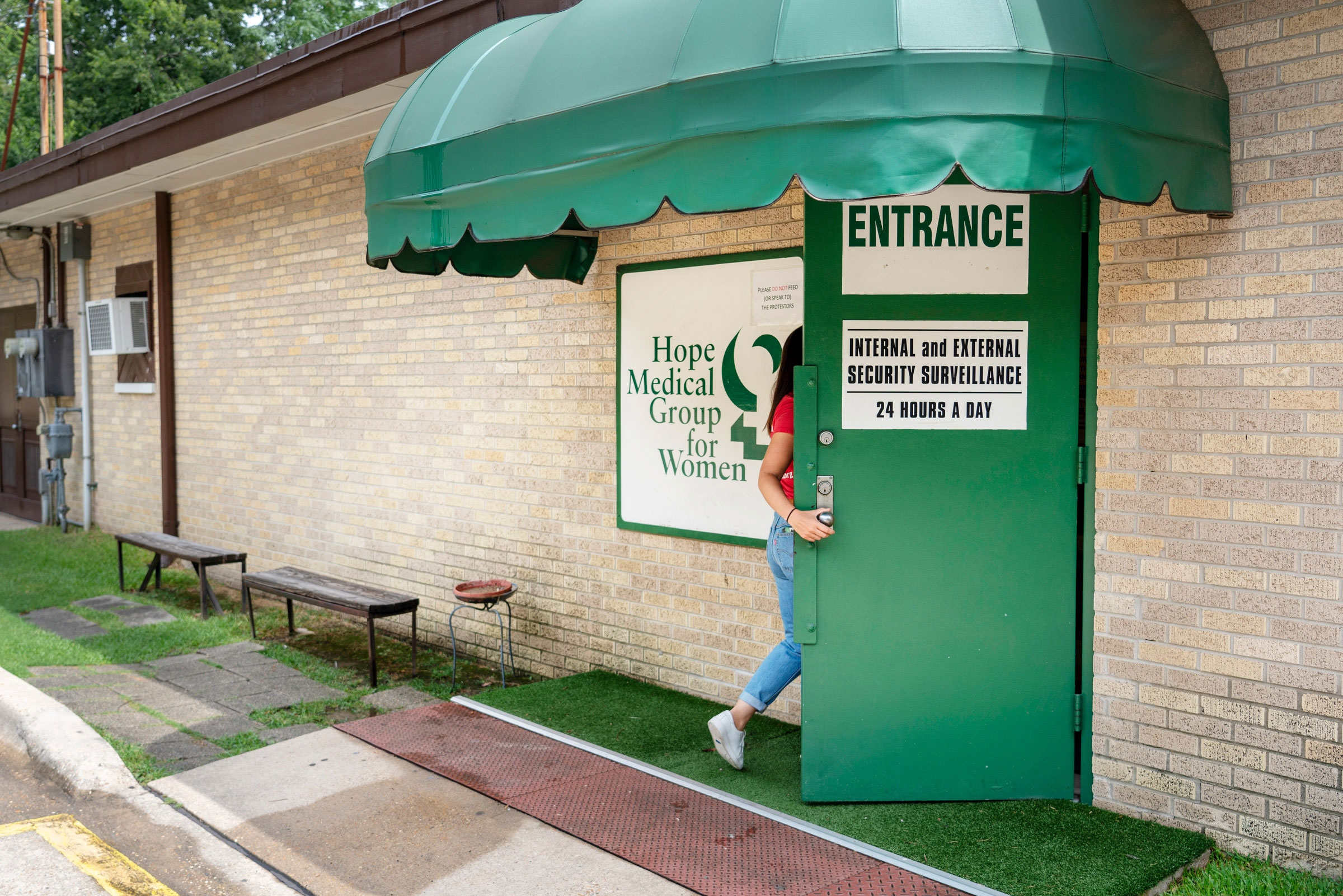
In 2016, the Supreme Court issued a ruling of its own that should have settled the matter. Whole Woman’s Health v. Hellerstedt, which struck down the Texas law that inspired Act 620, found that admitting privileges requirements offered no medical benefits and imposed undue burdens on patients’ ability to access services, since many Texans were forced to travel hundreds of miles to find an open clinic.
While other states with admitting privileges requirements stood down after the ruling, Louisiana continued to defend its law, rejecting the precedent set by Whole Woman’s Health. When the Fifth Circuit Court again ruled in Louisiana’s favor and upheld Whole Woman’s Health, CRR asked the Supreme Court to take the case, bringing issues of admitting privileges back to the high court. CRR continued to litigate the case, representing Hope Clinic (under its legal name, June Medical Services) and two of its physicians. Julie Rikelman, CRR’s senior director of litigation, presented oral arguments to the Supreme Court in March, and a decision is expected imminently.
To reproductive rights advocates, the Circuit Court’s rejection of such precedent on an identical law was troubling on multiple levels. It was seen as both a slap in the face to SCOTUS precedent and raised concerns that the rule of law was shifting over elections and judicial appointments.
“This should have been an easy case,” said the ACLU’s Dalven. “The lower court should have simply said, ‘The Supreme Court struck down an identical law four years ago, our job here is done. They didn’t do that. What that means is that even when we have a clear precedent, states are willing to fight every step of the way to shut down clinics and push abortion care out of reach.”
“The only difference between June Medical and Whole Woman’s Health is the states involved and the makeup of the Supreme Court,” added the coalition’s Bangel, referencing Trump’s appointment of Justices Neil Gorsuch and Brett Kavanaugh. “The federal Supreme Court and the independent judiciary is supposed to exist to prevent this exact situation. If we get a different decision than Whole Woman’s Health, it would, to my mind, invalidate the entire reason for the Supreme Court.”
In fact, the direct attack on precedent represented by June Medical Services is so acute that it moved even the relatively conservative American Bar Association to write an unprecedented amicus brief in support of CRR’s case, its first-ever brief on an abortion-related case.
The hidden consequences of Louisiana’s law
An additional element of the case also worries advocates. Louisiana has challenged the legal standing of Hope Clinic and its physicians to file a lawsuit on behalf of patients seeking abortion care. In doing so, Louisiana is trying to defy another very important precedent—this one established nearly 50 years ago at the same time as Roe v. Wade—that says that doctors, because of their close relationship with patients who possess the constitutional right to an abortion, have legal standing to bring lawsuits on their behalf.
If SCOTUS rules in favor of Louisiana on this point, it will become far more difficult for abortion rights advocates to litigate abortion rights cases in the future, since each case could require individual patients seeking abortions to be plaintiffs. “These are people who just want access to their health care when they need it,” Rivera said. “They’re not looking to file a lawsuit—especially over something that has been so vilified and politicized and stigmatized. This is just another strategy to push abortion out of reach by closing the courthouse doors.“
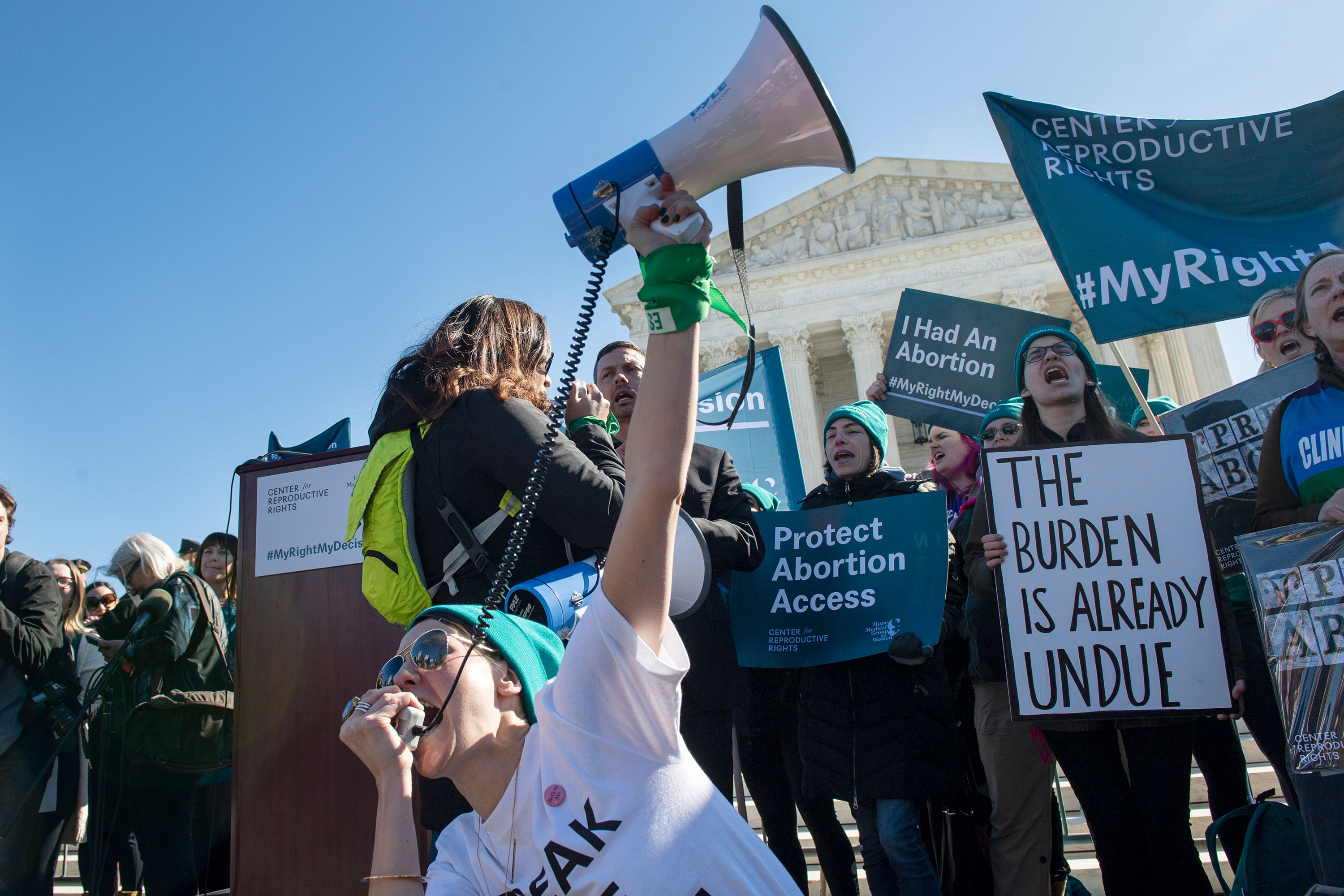
The threat to clinics and abortion access—in Louisiana and beyond—is more immediate. If the Supreme Court upholds Act 620 and admitting privileges stay in place, it will have potentially devastating impacts on abortion access in the state. “You have to understand that those clinics have never given up attempting to get privileges,” said Hope Clinic’s Pittman. “We’re talking years and years of trying different tactics to obtain these privileges.”
Hope itself has one part-time physician with admitting privileges and thus might be able to hang on for a time, but Pittman said it would be impossible for that doctor alone to address the state’s need for abortion care.
In other words, the ruling could ultimately prevent three of the state’s clinics from keeping their doors open. And clinic closures have a tendency to be permanent. Even after the Whole Woman’s Health verdict in 2016, the number of clinics in Texas never rebounded to the levels before the law was first enacted.
“It’s not like flipping a switch” when clinics shut down, said Rivera, whose CRR was also lead counsel in Whole Woman’s Health. “You have leases you give up, licenses that expire. You have to let people go, sell your equipment. You can’t just turn everything back on.”
An even larger threat is the message the SCOTUS ruling will send to other states. The Guttmacher Institute reported that 15 states have admitting privileges laws already on the books or are likely to quickly adopt them, if the Court upholds Louisiana’s law.
“If the Court were to let the Louisiana restriction stand or signal any willingness to weaken the standard, it will only increase the speed and ferocity with which state legislatures pass these kinds of restrictions,” said Dalven. “And they don’t even need that kind of urging because, last year, many states passed laws completely banning abortion in the hopes that changes on the Supreme Court signaled a willingness to revisit whether there was any right to abortion.”
“If we lose here,” she continued, “we may well see clinics ultimately being forced to close in many, many states.”
Roe v. Wade is still the law of the land. At least for now.
The stakes are so high that some commentators have suggested that June Medical Services v. Russo could effectively end the constitutional right to an abortion, even if it doesn’t touch Roe v. Wade, by enabling states to over-burden abortion providers to the point that no clinic will be able to afford to operate.
A further wrinkle, as Vox reported in March, is that Justice Kavanaugh may seek—as he has done in the past—to limit any win to be as narrow as possible. For instance, limiting any block of the law such “that an individual patient challenging an abortion restriction would only be able to secure a court order allowing them and them alone to obtain an abortion.” That possibility, combined with a ruling on Louisiana’s “standing” challenge—that only people seeking abortions can legally challenge anti-abortion laws—would lead to “a world where the only way to overcome an unconstitutional abortion restriction would be to find a lawyer, file a lawsuit, obtain a court order, receive the abortion, and do all of this before the pregnancy became so advanced that it was no longer legal to terminate it.” Vox continued, “As a practical matter, this world looks virtually identical to one where Roe was explicitly overruled.”
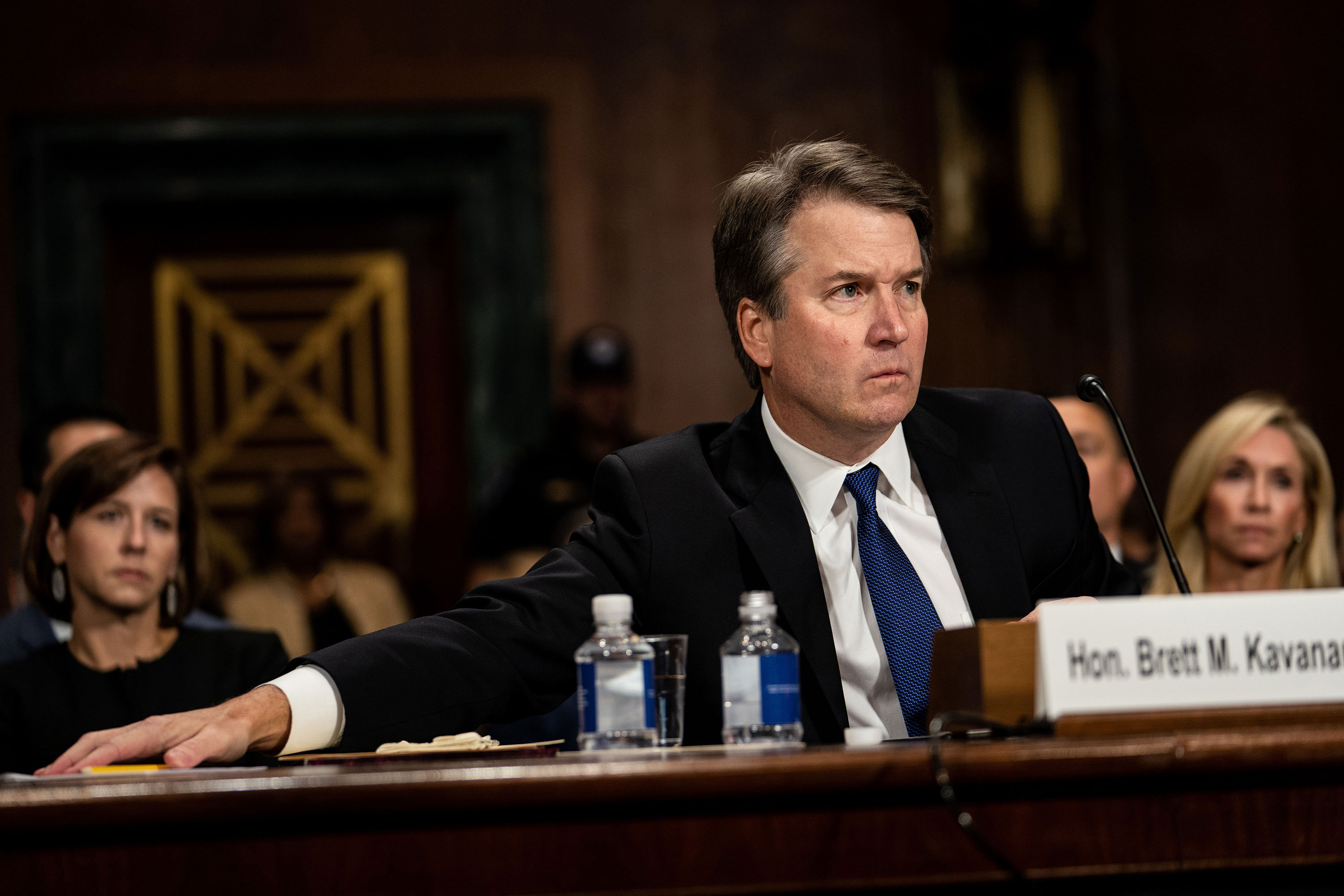
Effectively gutting abortion rights through indirect means, rather than by overturning Roe explicitly, might appeal to a conservative Supreme Court seeking to curtain abortion access without sparking public outrage.
“We are already seeing states go down to very few clinics and, in June Medical, that case could be lost without the Supreme Court having to say, ‘We overturn Roe v. Wade,’” said Jennifer Dalven. “There’s a concern that people might not understand it as dire as if you’ve got a headline that says, ‘Supreme Court overturns Roe v. Wade.’ But the effect will be exactly the same for many, many people as if they said there’s no right at all.”
“With these TRAP laws chipping away at access, what good is Roe if you can’t get to or into a clinic?” added Pittman. “A woman’s rights shouldn’t be determined by her zip code.”
“We will not go silently.”
The Supreme Court’s verdict in June Medical is expected any day now, and advocates are bracing for what might come next. “If the outcome is not what we expect or hope for, know that we will continue to fight like we always have,” said WWAV’s Harris, who was present in Washington for the oral arguments. “We will not go silently. It’s a moment in history where people get to look at the promise of America and what injustice looks like, and these things aren’t happening in a vacuum. When we’re talking about Black Lives Matter, that means people get a say over what goes on with their body, wholly.”
Even if the Court strikes down Act 620 and keeps with their recent precedent, Dalven said, abortion rights advocates shouldn’t rest easy. “Even if we win, we can’t let down our guard, because this will not take the wind out of our opponents’ sails. They will continue to push to make it harder and harder for people to get abortion care. And we should use the experience of what we saw during the COVID crisis. We can expect to see that more and more if we don’t keep up the fight.”
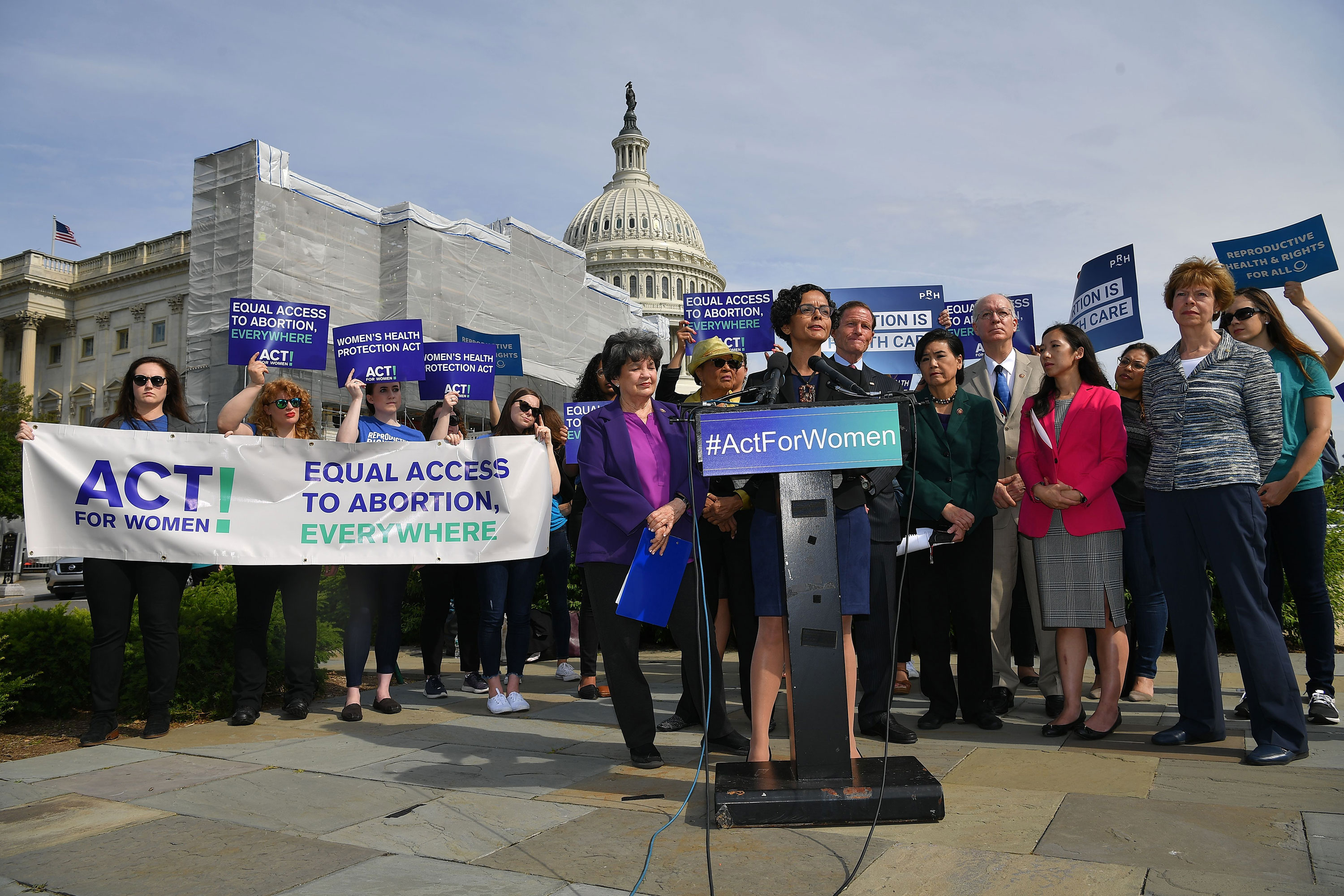
One of the next battles in Louisiana is already clear: a ballot measure, authored by the same legislator who introduced Act 620, that would restrict courts from ever interpreting the state constitution as protecting abortion rights. And in a clear demonstration of how anti-abortion legislation spreads from state to state, the coalition’s Bangel noted, this measure is identical to one passed in West Virginia two years ago.
“What we’re calling for is a shift in the winds here,” Bangel said. “We need to see a pro-choice access policy platform, and we need to see that everywhere. It’s not enough that Illinois, New York, Massachusetts and California are rolling back restrictive, outdated laws and enshrining access to care, because that’s just four out of 50 states. In a state like Louisiana, look at who we share borders with. If abortion becomes illegal here, people might have to travel 10 hours just to get care.”
The experience of the pandemic and the extreme measures that abortion opponents took to support their agenda is just more evidence to abortion rights advocates for the vital need to pass the Women’s Health Protection Act, a federal bill that would prohibit states from treating abortion providers differently from comparable healthcare services, stopping many TRAP laws in their tracks. The bill—modeled on the Voting Rights Act, said Rivera, in recognition of how states today are similarly refusing to uphold federally recognized constitutional rights—would give litigants a separate statutory basis to defend abortion rights in court besides the constitution or Roe v. Wade.
At present, the bill has majority backing in the House, but only 43 co-sponsors in the Senate. “We’re trying to build momentum so that, when the stars align, we’re not starting from scratch, and it could be adopted as quickly as possible,” said Rivera. “Frankly, we’re thinking about strategies that start now and that won’t bear fruit until after I retire.”
There have been bright spots, like proactive laws in Virginia to remove unnecessary restrictions on abortion providers that CRR had been fighting in court—which would have been unheard of just a few years ago. “In my 30 or so years,” said Rivera, “I have seen the legal landscape get worse, but the cultural landscape is shifting to our side, and cultural change, I think, precedes legal change.”
AJ Haynes, a patient advocate at Hope Clinic, now gives patients an information sheet compiled by Lift Louisiana listing the state politicians who have tried to shut the clinic down, and asks the patients to call them as constituents.
“I understand that it’s difficult to ask the people immediately impacted to advocate for themselves,” said Haynes, “but who else is going to do it? We need to name who is doing this, and they need to be held accountable by the constituents.”
“I’m committed to this work,” she continued. “I’m committed to celebrating bodily autonomy. I don’t know what that looks like post this decision, but I don’t think that people are going to give up. You can’t give up when your body is on the line. I’m on the line. I don’t have an option not to fight.”
